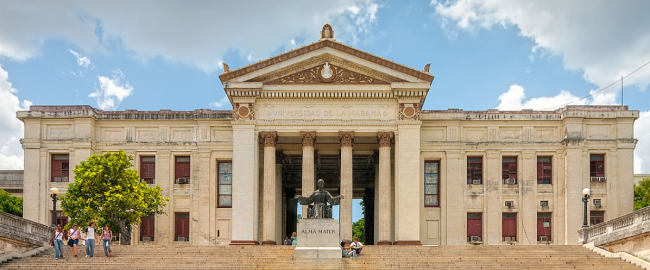You have /5 articles left.
Sign up for a free account or log in.

University of Havana
Wikipedia
Under pressure from Cuban exile leaders who are worried that a research institute known for taking a hardline stance toward the Castro regime might change focus, the University of Miami announced that it will not enter into any institutional agreements with Cuba's government or its universities.
The announcement prompted concerns among some Miami faculty members that vocal activist groups outside the university are driving the university's intellectual agenda. The groups argue that Miami should not engage with universities that are controlled by Cuba's totalitarian government, and whose own faculty lack academic freedom.
As Miami publicly distances itself from Cuba, many other American universities have moved to expand their ties there, following on the resumption of diplomatic relations between the two countries in 2015. The university's policy of non-engagement is all the more striking given the city of Miami's status as the capital of the Cuban diaspora and the university's strengths in Latin American and Caribbean studies.
“I was very shocked and disappointed with the announcement from President [Julio] Frenk that the university would not be entertaining new opportunities for collaboration with Cuban universities,” said Jafari S. Allen, an associate professor of anthropology and director of the Africana studies program at Miami.
“It seems to fly in the face of the president’s really important and I think correct aspiration for the University of Miami to be a hemispheric university that seeks out collaborations and that it is about seeking new knowledge and new partners. This seems to go very clearly against that for no good intellectual reason," said Allen, who has written a book about Cuba, ¡Venceremos?: The Erotics of Black Self-Making in Cuba (Duke University Press).
Allen said that some concerned faculty members would be meeting with Frenk this week. The anthropology department has also registered its concerns in a letter.
"While we feel that it’s important to hear the voice of the exile community in Miami, that’s not the only perspective and it’s not the only voice that should be heard,” said Caleb Everett, a professor and the chair of the anthropology department. "We understand the dilemma that Frenk is facing in this kind of case where he has a very vocal minority that understandably has strong opinions on the matter. Our strong belief is that to move forward with Cuba from an academic perspective we need collaborative efforts."
Miami, a private university, announced that it would not enter into institutional agreements with Cuban universities following a meeting between Frenk and 17 leaders of the Cuban-American exile community. Many Cuban-American leaders have been concerned about the departure of the longtime director of Miami's Institute for Cuban and Cuban-American Studies and the possibility that the institute might take a friendlier, more pro-engagement stance toward the Castro regime under new leadership.
In response to these concerns, the university said that it would “develop a mechanism” through which Cuban-Americans can provide input on the search for a new director.
“What troubles me is there’s no trace of any faculty involvement in any of these decisions,” said Gregory F. Scholtz, the director of the American Association of University Professors’ Department of Academic Freedom, Tenure and Governance.
“One of the ways in which the quality of higher education is preserved as we understand it is by preserving institutional autonomy. It seems to me that inviting external political elements into the conversation about an academic program is not consistent with that kind of institutional autonomy which we believes advances academic quality. The faculty ought to play a key role in decisions about programs, decisions about what kinds of ties the program has, and decisions about who directs the program.”
The president of Miami's Faculty Senate, Tomás Salerno, declined an interview request through an assistant, who referred questions to the university's communications office.
Controversy over a Cuba-Focused Institute
Miami has been embroiled in a controversy over the future of its Institute for Cuban and Cuban-American Studies (ICCAS for short) since it announced the departure of the institute’s longtime director, Jaime Suchlicki, as of Aug. 15. According to the Miami Herald, Suchlicki – who could not be reached by Inside Higher Ed -- described his departure as a resignation, saying that he strongly disagreed with the direction the university was taking in regards to Cuba studies.
The Herald described ICCAS under Suchlicki’s leadership as having functioned as “an academic weapon against the Castro regime.”
“Since it was founded in 1999, ICCAS…has served as a venue for many political organizations, including members of the island’s dissident movement,” the Herald reported. “ICCAS members also have issued strong criticisms against the Cuban government in the form of articles and research papers.”
Some Cuban American groups in Miami expressed concern about any change in focus for the institute. Orlando Gutierrez Boronat, a co-founder of the Cuban Democratic Directorate and a member of the coordinating body for a coalition of Cuban exile groups, the Assembly of the Cuban Resistance, called ICCAS “a thriving cultural center of this community” and “a first-tier scholarly institution.”
In a statement it issued in July, the assembly said it recognized “the need for an academic center, especially at the University of Miami, to study the truth about Cuba, without compromise or ambivalence, and about a regime -- the Castro regime -- that has committed and continues to commit serious human rights violations and violations to the fundamental freedoms of the Cuban people, as well as crimes against humanity.”
A second statement, in August, called on the university to "formally include the Cuban American community in the search committee" for the ICCAS directorship and recommended that the university “not engage in any exchange with Cuban academic institutions because they are under the direct control of Cuba’s one-party totalitarian state. As has been amply demonstrated, academia is seen as a tool of intelligence gathering and influence peddling by the Castro dictatorship. We are steadfastly opposed to opening up the University of Miami to this poisonous exchange.”
“We don’t want ICCAS to go the way of other institutions which have become compromised in their Cuban research through their engagement with the regime,” Boronat said.
Lisandro Pérez, a professor of Latin American and Latina/o Studies at the John Jay College of Criminal Justice and a Cuba specialist, expressed bafflement. “I don’t understand the concept. It’s not just that I disagree with it: I don’t understand the concept of a university research center that focuses on Cuba and does not have contact with Cuba,” Pérez said.
"I’m not sure what [such] a research institute would do except do programming that the local community likes and support dissidents and be partial in terms of the political situation."
Pérez thinks Miami will have a hard time recruiting Cuba scholars to take up the directorship position. “Who who is a serious scholar of Cuba would go to direct an institute in which essentially you’ve got these boundaries as to what you can do and not do?” he asked. “What UM has done is they’ve established a tradition with this institute with [elements of] the community essentially believing they have ownership."
Guillermo Grenier, the co-chair of the Latin American Studies Association's Cuba Section and the chair of Florida International University's Department of Global & Sociocultural Studies, also said he thought Miami would have a hard time recruiting candidates for the directorship. He said the controversy over the center is throwing into question the future of Cuba studies at Miami, where, he said, ICCAS "has had a long tradition of being an ally of the hardliners, and an ally of the U.S. hardline policy towards Cuba.”
"The alliance with the old-guard Cuban community, is it going to maintain itself?" asked Grenier, a sociologist. He said his own polling research shows a consistent trend among younger Cuban-Americans toward a desire for greater engagement with Cuba.
"You can’t avoid the reaction from a certain part of the community; what you can avoid is reacting to it in a way that empowers it, that kind of runs counter to the mission of the university," Grenier said. "There’s no real excuse for allowing a small portion of any constituency to shape the broader mandate of an institution."
Different Definitions of Academic Freedom
The interim director of the institute, Andy S. Gomez, did not return email and phone messages requesting comment.
Some Cuban American groups have opposed the appointment of Gomez, a former assistant provost at Miami, for what they say is his involvement with cruise travel to Cuba. In any case, Gomez appears to be only a placeholder: the university said in a statement that its search for the permanent director "will commence immediately" and that "no policy changes or hiring will take place at the institute" while the search is underway.
"At this point, the university is looking for a new director, and it will do so under its regular procedure, but it is now doing so, aware of the danger that Cuban intelligence presents to academic freedom," said Marcell Felipe, the president of the Inspire America Foundation, which advocates for democracy in Cuba. "This is a danger which too many American universities have ignored with alarming results."
"From the perspective of the University of Miami, I think their motivation is to promote academic freedom, but unlike other universities who often have an ethno-centric view of the world, Dr. Frenk wants to promote academic freedom, not just in the U.S., but in all universities in the world," Felipe said. "I think UM is raising the bar in setting a new code of ethics for dealing with such issues in countries like North Korea and Cuba, whose universities are run by party officials who pose as academics abroad while they crack down on free thought at home."
A University of Miami spokeswoman declined to make officials available for an interview on this subject, and did not answer questions posed by Inside Higher Ed that went beyond the university's written statement. The university did not provide further detail about what kind of mechanism it's putting in place to allow the Cuban-American community to have input in the ICCAS director search.
“They did not give any formal role to the community -- all the appointments are going to be made in the ordinary course of the university’s procedures -- but they will listen to recommendations from the community," Felipe said. "I think that’s healthy. Otherwise, you have institutions that end up being the stereotype that everybody critiques because they're up in an ivory tower, completely cut off."






